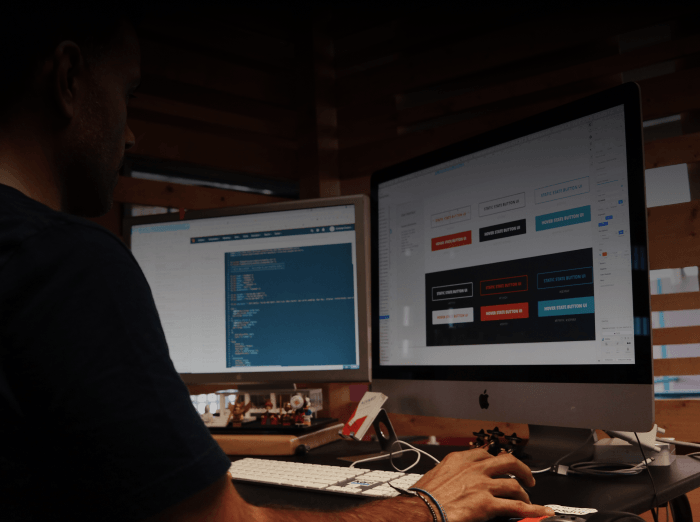12 Types in Software Development: A Comprehensive Guide to Discovering the Best Resources for Your Product Development
Subscribe to our blog to receive recent updates
At the beginning of the 21st century, the world has progressed rapidly, resulting in the emergence of various technologies that have become an integral part of our daily lives. To enter the market, you need to create your own product that fulfills your goals: it could be a website or an application for a mobile, computer/laptop, wearables or any other device. Each type of product requires different sets of skills and ways of developing, so you may need different types of software developers working together as a team to bring the product to life.
In this article we find out what software development is, and what types of software development exist. Of course, there is no single classification or terminology, but there are many points of agreement. We'll take a look at 12 types of software developers: the «timeless classics» and the «new to the market» due to current technologies and development trends.
What is a software development?
Software development is about creating a special type of application for specific devices or platforms. Despite the great number of development methodologies, including Agile methodologies, that we discussed in previous materials, it contains similar steps that are repeated at regular intervals: designing, coding, testing, fixing bugs, implementing new features and supporting.12 types of software developers
There are many classifications of software development. Some experts divide them by development side, type of platform or even employed technologies. We use all three factors and present 12 types of developers based on that.
Types of software development based on development tiers
Almost every software can be divided into three parts: the user-interacting part, the server part and connections between them. Front-end developers are responsible for the first part, back-end developers work on the second one and API developers build the bridges between front-end and back-end. That's why working with a team consisting of different types of developers is a great choice. Let's look at each type separately.Front-end developers
When you look at the interface of the software, you see the front-end developers work. They are focused only on creating UI and human-interface interaction, fixing bugs and checking if the user interface works correctly on different platforms. Front-end developers should collaborate with back-end ones to create a complete software where all product parts work in harmony.There are essential technologies for web development such as HTML, CSS and its frameworks, JavaScript which allow to create a web interface foundation. Also some advanced JavaScript frameworks, such as ReactJS, Vue.js and Angular, help to make more complex interfaces including ones with business logic. There are other technologies that are used in mobile development, and we will get to those a little bit later.
API developers
This type of developers help to build the bridges between the external visual interface of a product to its server part. They write non-UI code that executes in a front-end part and also interacts with functions running on the server.The API also allows one software solution to communicate with others. For example, APIs help open up map services as soon as you enter an address in the Google or Yahoo search bar or listen to a song on Apple Music or Spotify once you find it on Shazam.
Back-end developers
As you understand, front-end developers create the user interface, while the back-end developers deal with the implementation of the server part of the application. The back-end part includes server settings, applications and databases that are designed by developers. They create the functional core of the product, closely paying attention to system integration, its basic logic and user information processing. Back-end developers can also be involved in API integration, that’s why there are no engineers who work only with APIs.The performance of your product directly depends on the stability of the server part of it and your software fails regularly, it may be a problem with the backend. Moreover, the data should be properly handled in the system as it’s quite important for user protection and overall performance of the product.
Some of the essential back-end technologies in 2023 are JavaScript (and Node.js framework, in particular), Python, Java, PHP and Ruby (for example, Ruby On Rails framework).
Full Stack developers
Full Stack developers combine abilities of both worlds: front-end and back-end. These developers can work on all aspects of the product: creating user and server parts, combining them through API and testing it.Types of software development based on the type of platform
To develop a product for each platform, you need separate development teams and significantly different development tools. Let’s look at the several popular types of development and understand why you should choose one platform or the other.Web developers
Web developers make applications that can be accessed through the browser on any device connected to the Internet. Web development includes the following parts: making front-end and back-end parts of the product and their maintenance. So the previous classification of developers types fully describes what web development consists of.Why should businesses choose web development?
- A web application is available anywhere on any device connected to the Internet. There is no need to install the app on the customer's device.
- Modern web can be easily adapted and updated to the changing needs of the customer and expanded as users increase.
- Web applications are flexible enough to serve a wide variety of customers and offer personalized services.
- Compared to traditional software, web applications are more convenient, easy and inexpensive to update. That means it can help you reduce the development cost.
Desktop developers
Desktop developers create applications that run locally on computers or laptops with or without an internet connection. They run on Windows, MacOS and Linux operating systems. If you've ever worked with products from the Microsoft Office family, then you probably understand what desktop applications are. Desktop developers use programming languages like C#, Swift, Objective C, Java, C++ and some others.Desktop apps were the main type of software 20 years ago, but due to the massive spread of portable devices like smartphones, tablets and wearables in the 2010s, the development vector has shifted towards them and desktop development has become less common. One of the current development trends is the shift to Cloud technology, whichalso reduces the popularity of desktop development. But a lot of customers still use desktop apps everyday for the following reasons:
- Some companies offer their services offline, without the need for an internet connection or access from all devices. That's why desktop development is ideal for them.
- Desktop apps can provide a higher level of security than web applications because they are installed locally on the user's device. Also some applications can encrypt user data, making it difficult for hackers to access confidential information.
- Desktop applications can use some features of the device such as ability to access the file system or use the camera or microphone. This level of access is not possible for web applications.
Mobile developers
Mobile developers work with apps for mobile operating systems like Android and iOS. Most of them use an internet connection like Instagram that uses it to download content or Notes that can be edited from all devices. However, some companies offer offline functionality – for example, some games can be played without the Internet.Nowadays almost every business is transitioning to providing digital services and their needs for mobile app development are growing every year. Companies develop their own apps for each platform or create cross-platform solutions. The last one relies on a single set of tools to make applications compatible on all platforms. However, a lot of experts agree that making separate apps for every platform is more effective than cross-platform solutions.
Native app development uses a completely different set of tools from web development: Java or Kotlin languages for Android and Swift for iOS. Because of the strong differences in technology, companies hire multiple development teams to create a product for multiple platforms.
Many companies prefer mobile app development as an effective channel for communication with customers for the following reasons:
- Communication through mobile apps saves the user time because all the necessary functionality is already built into the product. For example payment functions in the app. Zensar research shows that the number of payments for mobile apps has grown from 41.8% in 2019 to 52.2% in 2023.
- The mobile app is a great marketing channel. With interactive elements users can customize recommendations for products and services they can use. This thing can help increase brand recognition.
- Mobile apps are convenient for implementing technological trends like IoT. You can incorporate your services into other devices and provide new functionality to your customers.
Types of software development based on technologies involved
Companies should always pay attention to external factors: the current situation on the market, tech news and breakthrough tools. Technological trends often help Executives choose new development strategies and implement new technologies. We will look at several types of developers that have appeared because of current software development trends.Cloud developers
In 2022 cloud technologies became an essential part not for startups and small businesses, but also for big companies. Using cloud technologies became one of the most remarkable trends in recent times because the transition to this technology is very easy. Google, Amazon, Microsoft and other big corporations presented technology and offered their services to other businesses. There are several examples of cloud technologies such as Dropbox, Google Drive, GitHub and many more.Nowadays businesses are interested and looking for professionals who can work with cloud technologies because of the ease and flexibility of deploying this technology. Their task is to create applications and programs that will be stored on a remote server, not on local storage. The cloud developer sets up architectures using Cloud providers like AWS (Amazon Web Services), Google Cloud, Microsoft Azure and many others, and also manages security and access to the system. The developer must know Java, JavaScript, Python, Go and other back-end languages.
VR/AR developers
Virtual, augmented and mixed reality have been predicted as a technological trend many years ago. In recent years these technologies have evolved rapidly. According to Statista, the VR, AR and MR market will be worth $250 billion by 2028.VR technologies are being implemented in social aspects, like healthcare, transport, education and many more. Also the announcements of new VR/AR devices, like Apple Vision Pro, the most recent and the most notorious one, are raising stakes and giving new hopes for further development. So VR/AR software development may become in demand.
Types of data-related software development
Big companies collect huge amounts of data to analyze their customers, their behavior to identify trends and improve the product. This way companies can reduce the action-response time which is important for predicting further user interaction scenario. Businesses hire different types of Data engineers to collect, store and move the data, build models from it, analyze it and many more. The following types of developers have a lot of similarities but also have some differences that we describe further.Bid Data engineers
Big Data engineers are able to help set up analytic tools and systems for very big amounts of data. They create programs to store and retrieve large amounts of data in many types of systems such as data storages, ETL systems or relational databases. Developers should know frameworks and systems for distributed big data storage and processing such as MapReduce, Hadoop or Spark as well as with SQL, Java, Python and R languages.Data Science engineers
Data science is a broad term that is used for scientific methods of extracting knowledge from data. It combines computer science, mathematics, and business logic. Data science developers apply their knowledge in creating software to analyze data sets and build mathematical models based on that analysis to predict product potential. As you understand, this is a software for inner use in companies. Developers use Python and R languages and knowledge of linear algebra and multivariate computing.Data Science is one of the fastest-growing areas, and this trend becomes more evident every year as new technologies emerge, such as artificial intelligence and neural networks, which we'll talk about a little later.
AI engineers
We think the following fact is obvious: Artificial Intelligence is the number 1 trend in 2023. AI-based tools like ChatGPT, Midjourney, Copilot, or Orchard have impressed everyone with their potential. While previously everyone was sure that this technology had no risks for artists, musicians, writers, designers and developers, now the community is talking about these risks with more concern. We will talk about how to use ChatGPT in programming and whether it will kill the development profession in the following articles.AI developers specialize in making products and applications based on artificial intelligence. They work on algorithms for machine learning, natural language processing, computer vision and others. AI developers use Python, R, Java and C++, and use frameworks and libraries such as TensorFlow, PyTorch, and Scikit-Learn to design, train, test and deploy complex models. In addition AI developers actively collaborate with Big Data engineers who help with the big data processing and analysis that is required to build effective models.
Conclusion
In this article we discussed different software development type classifications. This is not an exhaustive list of all types of software developers as it is important to remember that your needs will change, and over time you will look for different types of software developers. However, two things should remain unchanged: determining the requirements and carefully researching the professionals you want to hire.You probably found in this article some types of software developers to hire, or you didn’t and need some advice. In both cases, feel free to contact us with your ideas and questions and we will be happy to help you with the implementation of different types of software developers in your project or help you figure out what suits you best.


